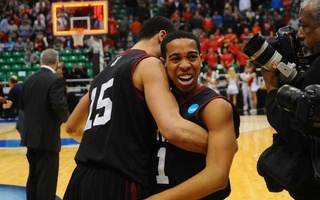Harvard regained its accustomed perch atop the U.S. News and World Report's annual ranking of colleges this year, edging out previously top-ranked Yale and tying with Princeton.
Last year's number three ranking followed six consecutive years in which Harvard reigned supreme. Just as last year's drop resulted from a change in U.S News's methodology, this year's return to the top was largely the result of corrected accounting procedures.
Harvard officials reacted to the news calmly, restating their belief that the rankings are not useful.
"We've been working on that all year, now we believe Harvard is number one in humility," joked University spokesperson Alex Huppe.
Reaction among the class of 2001 was universally positive, but the vast majority of students interviewed said the rankings did not affect their choice of fair Harvard.
"I didn't pay much attention to it, but now that I'm here it makes me feel pretty good, " said Justin V. Skinner '01.
Reaction among parents was somewhat stronger.
"It's about time," said one Class of 2001 mother who requested anonymity lest her son die of embarrassment before classes even start.
President Neil L. Rudenstine declined to comment on the rankings this year, as he has done every year since his appointment.
Huppe said the president and the University do not believe the rankings have any empirical value.
"It's always nice to be ranked highly, but we don't put any stock in these rankings. They're basically just beauty contests," Huppe said. Many schools have sounded similar concerns about the validity of the survey, saying they fear the rankings may have undue influence over students applying to colleges. Duke University, which moved up two spots to tie with Yale for third in this year's survey, released a statement from its president, Nannerl O. Keohane, saying the survey was "good news indeed" but acknowledging "that such surveys, even when they are as positive as this one for Duke, are not the basis on which students and their families should determine college choice. " Survey Methodology The rankings are based both on statistical data and a reputation survey which break down a school's statistics into seven categories: academic reputation, student selectivity, faculty resources, retention rate, financial resources, alumni giving and a "value added" category, calculated by taking the difference between the expected and actual graduation rates. The largest change in the methodology of the survey for this year also resulted in the largest change in rankings. Instead of reporting the composite scores of each school to one decimal place, scores were rounded off to the nearest whole number, creating far more ties between schools than have occurred in the past. Robert J. Morse, research director for the America's Best Colleges issue of U.S. News and World Report, said the magazine has been considering this change for some time to prevent statistically insignificant differences between schools from affecting the rankings. Harvard and Princeton each received a composite score of 100. In individual categories, Harvard ranked first among colleges in graduation rate and student selectivity. It was also given a 3.9 out of 4 in academic reputation and ranked second in faculty resources. Last year, the College slipped in the survey because the magazine was able for the first time to use the percentage of classes' enrolling more than 50 students as a criterion. Since Harvard's percentage was significantly higher than Yale's or Princeton's, the school's winning streak was doomed. In one year, the percentage of such classes Harvard reported dropped by more than half, from 21 percent to 10 percent. According to Dean of the college Harry R. Lewis '68, the reason for the drop was a change in the way U.S. News accounted for large courses broken into subsections, such as Spanish A or Math la. Last year they were counted as a single course with more than 50 students, but this year they were reported in accordance to complicated and extensive set of rules. Lewis said Harvard had a number of conversations with the editors of the survey to ensure that the data Harvard reported was as accurate as possible
Read more in News
Amnesty to Protest Turkish ViolationsRecommended Articles
-
Harvard Wins in Global Brand RankingsHarvard has the best university reputation in the world, according to the Times Higher Education’s seventh annual 2011 World University Reputation Rankings.
-
 Harvard's Impeccable Reputation
Harvard's Impeccable Reputation -
 Cabot House
Cabot House -
 Kirkland House
Kirkland House -
 Adams House
Adams House -
 Men's Hoops No. 21 in Early Rankings
Men's Hoops No. 21 in Early Rankings













